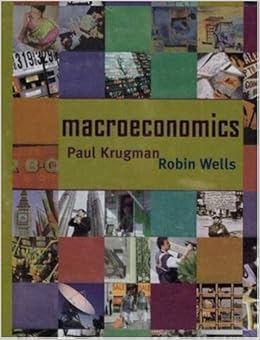
Economics 2nd Edition By Paul Krugman Nyt
A message for regular readers of this blog: unless something big breaks later today, this will be my last day blogging AT THIS SITE. The Times is consolidating the process, so future blog-like entries will show up at my. This should broaden the audience, a bit, maybe, and certainly make it easier for the Times to feature relevant posts. It will also, for technical reasons, make my life simpler — you’d be surprised how many hoops I have to go through to get these things posted. But that’s not the reason. Anyway, I expect to be doing the same sort of thing, mixing regular columns with stuff, usually wonkish, that doesn’t belong in the regular paper. Old blog posts will remain available!
New York Times Columnist Paul Krugman says the world's running out of oil. Canada’s current Prime Minister who specializes in economics and who’s father runs.

Over the past couple of days we’ve had two very good critiques of the Tax Foundation “model” of tax cuts, which comes closer than any other to telling Republicans what they want to hear. What is enterprise edition. Takes on TF’s bizarre treatment of the estate tax, which should make no difference in the small-open-economy approach they claim to be following, but somehow becomes a huge growth factor in their analysis. Follows up, among other things, on my point about: If your claim is that tax cuts will induce huge inflows of foreign capital, you should be projecting large future payments of income to foreigners, so that domestic income doesn’t grow nearly as much as GDP. TF somehow doesn’t.
So are there real-world examples of the latter issue aside from Ireland? Actually, yes — the so-called of eastern Europe. These economies have attracted huge capital inflows from Western Europe, in part because of low wages, in part because of. This has helped GDP grow — but national income has lagged, because so much of the growth has gone to foreign investors: Average households have not seen enough of the fruits of economic growth.
Meth use signs. Those rewards have gone disproportionately to the owners of capital, and in these countries, that tends to mean foreigners. In the Czech Republic, Hungary, and Slovakia, the most important sectors are largely or wholly foreign-owned. You can see what this has meant for the Czech Republic in the figure.
For what it’s worth, the lag of GNP behind GDP shown there is several times as large as most predictions of extra growth from U.S. Now, I don’t believe this tax “reform” will produce anything like the capital inflow its defenders claim. But even if it does, Americans won’t see much of the benefits. Yesterday a former government official at a meeting I was attending asked a very good question: have any prominent Republican economists taken a strong stand against the terrible, no good, very bad tax legislation their party just rammed through the Senate? I couldn’t think of any.
And this says something not good about the state of at least that side of my profession. We can divide Republican economists into three groups here.
First are those enthusiastically endorsing the specific bill, like the 137 signatories of the. They’re a pretty motley crew, many not economists at all, some apparently nonexistent, and some with, um, interesting backgrounds: Other names on the economists’ letter may raise eyebrows.
Eleazarian is listed as an economist with the American Economic Association. But membership to the AEA is open to anybody who coughs up dues, and membership simply grants access to AEA journals and discounts at AEA events. Eleazarian is a former attorney who lost his law license and the ability to practice law in California after he was convicted and sentenced to six months in prison for forging a judicial signature and falsifying other documents. His current LinkedIn profile lists him as a paralegal at a law firm.
Second are people like the Nine Unprofessional Economists – all of whom have, or used to have, real professional reputations, who signed that open letter asserting that corporate tax cuts might produce rapid growth. As Jason Furman and Larry Summers pointed out, they misrepresented the research they claimed supported their position, then. The nine economists’ original Nov. 25 letterestimated that under the House and Senate proposals, “the gain in the long-run level of GDP would be just over 3 percent, or 0.3 percent per year for a decade.” The conservative economists wrote to Summers and Furman on Thursday, saying the 3 percent growth assertion “did not offer claims about the speed of adjustment to a long-run result.” So that’s explicit aid and comfort to tax cutters, with an extra dose of dishonesty and cowardice.